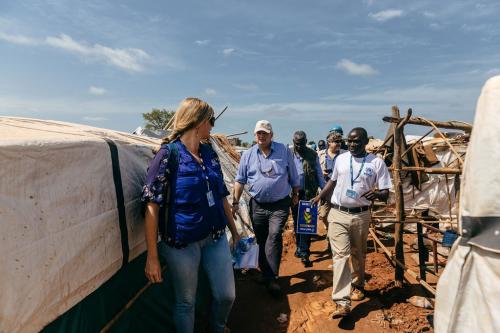South Sudan crisis deepens as once-stable areas fall into violence – UN relief chief
Recently returned from a three-day visit to South Sudan, United Nations Emergency Relief Coordinator Stephen O’Brien painted a grave picture of the enormous humanitarian crisis facing the world’s newest country and the devastating impact of the ongoing violence on its people on Aug 10.

On 2 August 2016, Emergency Relief Coordinator, Stephen O’Brien (centre), visited the protected site adjacent to the UNMISS base in Wau, South Sudan, where more than 20,000 people are seeking protection as a result of recent conflict.
“Let me be clear: people in South Sudan are not just fleeing their homes because they need food, shelter or medical care and school for their children. They are fleeing [because they] fear for their lives,” Mr. O’Brien told reporters at UN Headquarters in New York.
“We must protect them, and we must save their lives,” he stressed.
The humanitarian situation in the country has witnessed significant deterioration, including in areas that were once relatively stable. Since December 2013, over two million people have fled their homes. Some 1.6 million are displaced within South Sudan and more than 900,000 people have fled to neighbouring countries.
The situation has worsened since clashes between rival forces – the Sudan People's Liberation Army (SPLA) loyal to President Salva Kiir and the SPLA in Opposition backing First Vice-President Riek Machar – erupted in and around the capital, Juba, on 7 July, close to the fifth anniversary of the country's independence.
UN compounds and civilian protection sites managed by the UN Mission in South Sudan (UNMISS) were attacked during the fighting, and, according to the High Commissioner for Human Rights, Zeid Ra'ad Al Hussein, a preliminary UN investigation into the recent fighting and its aftermath revealed that Government security forces carried out killings and rapes, and looted and destroyed properties.
Over the last month alone, some 70,000 South Sudanese crossed the border into Uganda as refugees.
Moreover, some 4.8 million people across the country are facing severe food insecurity and 250,000 children are severely malnourished. To add to the suffering, the country is also battling a cholera outbreak.
In this course of his visit, Mr. O’Brien travelled to Wau and Aweil, two places that were not long ago considered as beacons of hope for their prospects for development.
Now, Wau is mired in severe conflict and Aweil is suffering its worst food insecurity in years. “The situations that I saw in Wau and Aweil are […] emblematic of the devastating fate that has befallen this country,” noted Mr. O’Brien.
While in the country, Mr. O’Brien who is also the UN Under-Secretary-General for the Coordination of Humanitarian Affairs met with President Kiir, as well as other top Government officials.
“I expressed in clear terms my shock and dismay at the appalling reports of violations committed against civilians during fighting in recent months, including in Juba,” said Mr. O’Brien adding that, in particular, he condemned the heinous acts of sexual violence carried out against women and girls, including by members of the armed forces.
Recalling that 57 aid workers have been killed in the country since December 2013, Mr. O’Brien stressed, “This is unacceptable and unconscionable. I urged the President to take immediate action to end the impunity that has prevailed to date.”
Underscoring the extremely difficult conditions for humanitarian workers, the UN relief chief reiterated that they should be granted free, safe and unhindered access to all people in need, wherever they may be, and that they, themselves, and their assets must be respected.
“Humanitarians are in South Sudan to save lives and for no other reason,” he said.
“[They are] risking their own [lives], and I am appalled that they continue to be harassed, targeted and killed.”
Mr. O’Brien also thanked the international community for its continued support to South Sudan, including more than half a billion dollars donors provided to the Humanitarian Response Plan, the UN humanitarian chief pointed out that a gap of $700 million still persists, and that this will increase once the appeal is revised in the coming weeks to reflect the needs that have arisen since the beginning of 2016.
“I call on the international community to make sure together we can avert an even worse humanitarian tragedy in South Sudan,” he urged.
In South Sudan, Mr. O’Brien also met with the leadership of UNMISS and discussed the challenges facing the African country and efforts underway by the UN to better protect civilians both inside its bases and beyond.
“The scale, breadth and depth of humanitarian needs in South Sudan continue to grow, and the plight of the people demands the world’s attention,” he concluded.
Source: United Nations
- 298 reads
Human Rights
Fostering a More Humane World: The 28th Eurasian Economic Summi

Conscience, Hope, and Action: Keys to Global Peace and Sustainability

Ringing FOWPAL’s Peace Bell for the World:Nobel Peace Prize Laureates’ Visions and Actions

Protecting the World’s Cultural Diversity for a Sustainable Future

Puppet Show I International Friendship Day 2020

